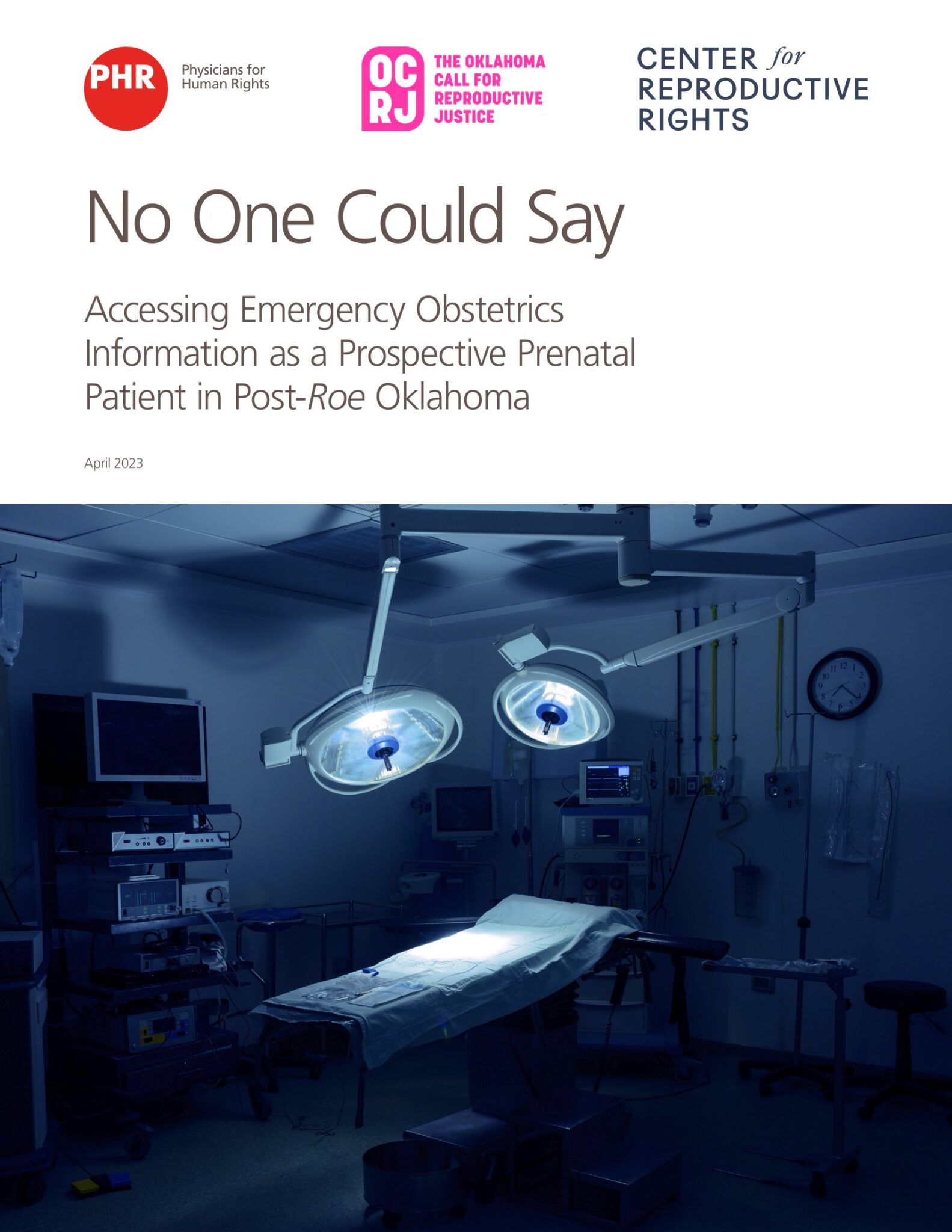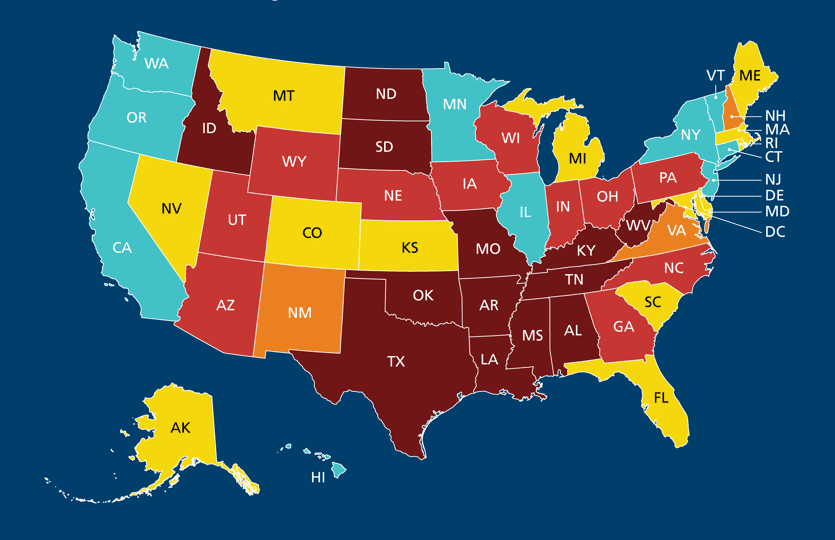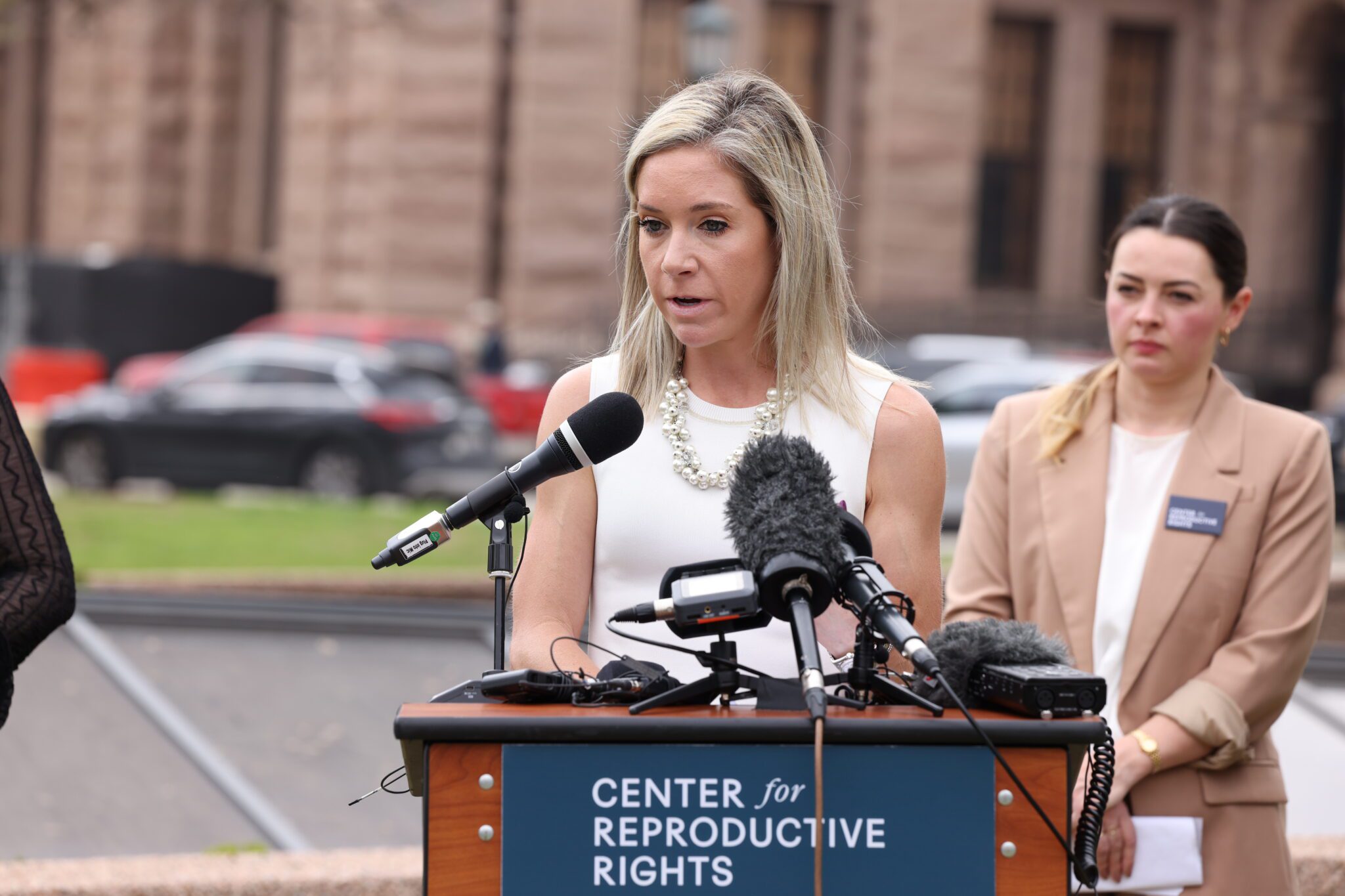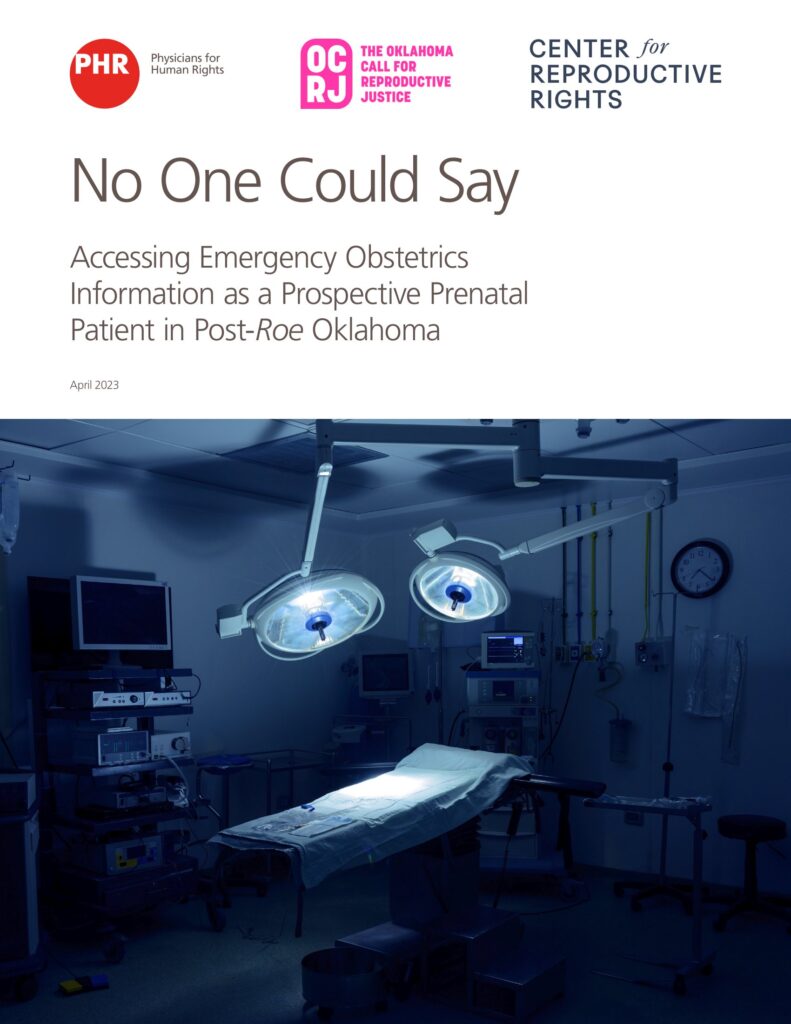New Study Finds Oklahoma Hospitals Unable to Provide Clear and Accurate Information on Emergency Obstetric Care
Report by the Center, Physicians for Human Rights, and Oklahoma Call for Reproductive Justice raises concerns about pregnant patients’ ability to access life-saving obstetric care in states where abortion is banned.

Most Oklahoma hospitals are unable to provide information on their policies on emergency obstetric care to prospective patients, according to a new report jointly published by Physicians for Human Rights, Oklahoma Call for Reproductive Justice, and the Center for Reproductive Rights.
When asked how they handle obstetric emergencies, Oklahoma hospital staff provided opaque, contradictory or incorrect information about their policies on when abortion care is available. They also provided little reassurance that clinicians’ medical judgment and pregnant patients’ needs would be prioritized.
Oklahoma currently has three overlapping and inconsistent state abortion bans in effect that were enacted around the overturning of Roe by the U.S. Supreme Court last year. The state’s bans threaten to impose severe civil and criminal penalties on health care providers.
Although, in March 2023, the Oklahoma Supreme Court struck down a 2022 criminal ban on the grounds that the state constitution protects a right to abortion in life-threatening situations, three other bans remain in place, including two that have comparable language to the law struck down. As a result, the March ruling has little practical effect at this time.
No One Could Say: Accessing Emergency Obstetrics Information as a Prospective Prenatal Patient in Post-Roe Oklahoma shows how near-total abortion bans like those in Oklahoma fuel confusion about clinicians’ ability to provide care during obstetric emergencies, even when the lives, health, and safety of pregnant people are at stake.
The report raises grave concerns about the ability of pregnant people in Oklahoma—and the other U.S. states with similar, near-total abortion bans in place—to receive clear and accurate information on the treatment they would receive from hospitals if they were to experience dangerous pregnancy complications. The report further demonstrates how abortion bans have impeded hospitals and clinicians from fulfilling their ethical and professional responsibilities.
“This report is a stunning indictment of post-Roe medical care for pregnant people. Oklahoma’s extreme and inconsistent abortion bans put people’s health and lives at risk every day,” said Risa Kaufman, director of U.S. human rights at the Center, which has legal challenges pending against abortion bans in Oklahoma. “These devastating findings from Oklahoma are consistent with accounts we are hearing from patients and health care professionals in other abortion ban states. These bans undermine the ability and freedom of patients and their providers to make safe, evidence-based health care decisions.”
Media Coverage:
- NPR: “In Oklahoma, a woman was told to wait until she’s ‘crashing’ for abortion care”
- The Oklahoman: “‘My baby’s not gonna make it and neither am I’; Women flee Okla. for life-saving abortions”
- CNN: “Amid contradictory laws, hospitals in one state were unable to explain policies on emergency abortion care, study finds”
- The Lancet: “US abortion bans violate patients’ right to information and to health”
None of the 34 Hospitals Contacted Gave Clear, Consistent Information About Obstetric Emergencies That Supported Clinicians’ Ability to Protect Their Patients
Using a “simulated patient” methodology, the study’s researchers posed as prospective patients who had just moved to Oklahoma with their spouse. The researchers called Oklahoma hospitals that provide prenatal and peripartum care, asking both general questions about the hospital facility and specific questions about cases where abortion care may be required to save a pregnant patient’s life.
Researchers were able to reach 34 of the 37 Oklahoma hospitals they attempted to contact between November and December 2022. Hospitals affiliated with an Indigenous nation were excluded from the study; because they operate under federal oversight, it is unclear how the Oklahoma bans impact them.
Of the 34 hospitals reached:
- 65 percent (22 hospitals) were unable to provide information about procedures, policies, or support provided to doctors when it is clinically necessary to terminate a pregnancy to save the life of a pregnant patient.
- 41 percent (14 hospitals) provided unclear and/or incomplete answers about whether doctors require approval to perform a medically necessary abortion.
- Four hospitals provided information that was factually wrong. Three representatives stated that their hospitals do not provide abortions at all, though abortion is legal in Oklahoma in the event of medical emergencies or to “preserve the life” of the pregnant person.
- Only two hospitals described providing legal support for clinicians in emergency pregnancy situations.
As the report demonstrates, narrow exceptions to abortion bans such as “only to save the life” of the pregnant person stoke uncertainty and fear for pregnant people, health care providers, and hospitals alike. Obstetric hospitals are left to determine what guidelines, processes, and legal support, if any, to establish for providers navigating the law on emergency pregnancy care.
One hospital representative told the caller that the pregnant patient’s body would be used as an “incubator” to carry the baby as long as possible.
Abortion is now illegal in 13 U.S. states.
After Roe Fell: Abortion Laws by State
On April 24, North Dakota became the 13th U.S. state to enact a near-total ban on abortion.
Providers Face Severe Penalties and Are Reluctant to Provide Care
Oklahoma providers face severe criminal and civil penalties, such as loss of their medical licenses or long prison sentences, if prosecutors disagree with their decision to provide life-saving abortion care. Such legal risks and uncertainties place Oklahoma hospitals and health care providers in an untenable position when their patients require abortion care during an obstetric emergency.
“In no other area of medicine are healthcare providers debating whether or not they can save a patient’s life because they are afraid of going to jail,” said Rabia Muqaddam, senior staff attorney at the Center. “We will continue to push back on extreme abortion bans like Oklahoma’s that threaten the health and lives of pregnant people.”
The report emphasizes that abortion bans put providers in a position of “dual loyalty,” forcing them to balance their obligations to their patients against the threat of severe legal and professional sanctions.
“The laws criminalizing abortion in Oklahoma place both patients and providers in an untenable situation,” said Michele Heisler, MD, MPA, report co-author, medical director at PHR, and professor of internal medicine and public health at University of Michigan. “Oklahoma hospitals and medical professionals have been thrust into a crisis of ‘dual loyalty,’ where they have to abide by punitive laws that can harm patients while seeking to provide ethical, high-quality, patient-centered medical care.”
Related content.
Zurawski v. State of Texas
The Center filed a lawsuit on behalf of five Texas women—each denied abortions after facing severe and dangerous pregnancy complications—and two Texas obstetrician-gynecologists.
Report Calls for Repeal of Abortion Bans
In light of these alarming findings, the report calls for the Oklahoma legislature to repeal its abortion bans and decriminalize abortion. It also urges the state and federal government to ensure all people can access comprehensive reproductive health care with dignity, free from discrimination and criminalization, regardless of where they live.
“Oklahoma’s abortion bans threaten the lives and health of pregnant Oklahomans. We know that this callous, intentional disregard for pregnant people from the state’s elected leaders will disproportionately harm those who already face discrimination in accessing medical care, including Black, Indigenous, and other Oklahomans of color, young people, and people living on low incomes,” said Tamya Cox-Touré, chair, Oklahoma Call for Reproductive Justice. “It is preposterous that the State can force people to sacrifice their health and lives. We hope that these powerful research findings will help lead to the removal of these dangerous barriers to safe and quality healthcare for pregnant people. We ask all Oklahomans and their health care providers to speak out against the serious harms caused by Oklahoma’s abortion bans. Let this report inspire action because we need everyone in this fight.”
Moreover, the report urges health care professionals and medical associations to speak out against laws criminalizing abortion or otherwise restricting abortion access, including during obstetric emergencies.
“Our report found that prospective patients were not able to access even basic information about the emergency care they might receive during pregnancy,” said Dr. Heisler. “These findings should be a wake-up call to health professionals everywhere to speak out against laws criminalizing abortion, which jeopardize clinicians’ medical decision-making to prioritize their patients’ health, well-being, and human rights.”
Read the full report here:





